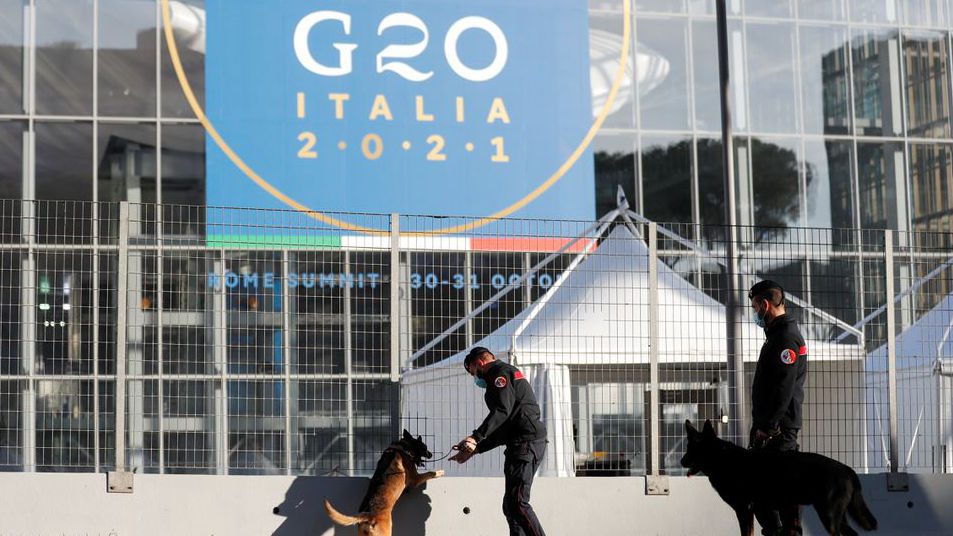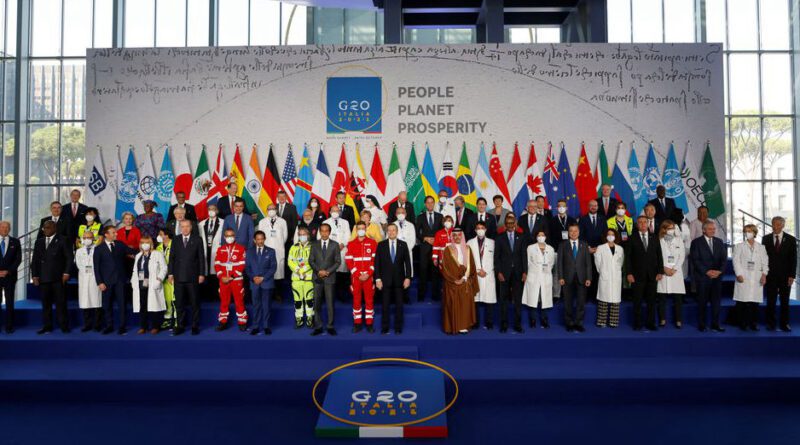G20: Climate and Covid top agenda as world leaders meet
Climate change and Covid are top of the agenda of leaders from the world’s major economies meeting in Italy.
It is the first time the G20 leaders are meeting face-to-face since the start of the pandemic.
However, China’s Xi Jinping and Russia’s Vladimir Putin are not in Rome for the summit, choosing to appear via video link instead.
The talks come amid increasingly dire warnings for the future if urgent action is not taken to cut emissions.

The G20 group – made up of 19 countries and the European Union – is estimated to account for 80% of the world’s carbon dioxide emissions.
Italy’s Prime Minister Mario Draghi opened the two-day summit, telling world leaders that “going it alone is simply not an option. We must do all we can to overcome our differences”.
The summit will set the tone for the COP26 summit in Glasgow which begins on Monday, and there are still sharp divisions between countries on their commitments to tackling climate change.
“Multilateralism is the best answer to the problems we face today. In many ways it is the only possible answer,” Mr Draghi said in his opening statement.
Read Also: BREAKING NEWS!! Premier League Reveals When 2021/22 Season Will Begin
Speaking to the BBC, UK Prime Minister Boris Johnson described climate change as “the biggest threat to humanity”, saying it posed a “risk to civilization basically going backwards”.
However, he acknowledged that neither the G20 meeting nor COP 26 would halt global warming, but could, if the right measures were taken, “restrict the growth in the temperature of the planet”.
According to Reuters news agency, a draft communiqué outlines a promise from the G20 to work towards limiting the rise in temperatures to 1.5C (2.7F), saying it “will require meaningful and effective actions by all countries”.
The draft also notes the need for “developed countries to mobilize $100bn (£73bn) annually from public and private sources through to 2025 to address the needs of developing countries” so they can tackle climate change – a promise richer countries have failed to keep since 2009, when it was initially pledged.
The last few years have seen many countries looking after number one. They have made their own vaccines, they have put up trade barriers, they have put economic growth ahead of fixing the climate crisis.
Mario Draghi’s point is that this has to stop. The Italian PM is saying that if G20 leaders want to curb global warming, end vaccine inequity, and sort an economic recovery, they have to start thinking and acting more multilaterally.
And that doesn’t just mean coming to summits. It means – at times – putting wider global interests above narrow national imperatives. That is a big ask because it often involves challenging voters. So far not all world leaders seem ready to do that.
There remain divisions over whether much wealthier nations are ready to cut carbon emissions, give more Covid vaccines to developing countries, and stabilise volatile energy prices.
The G20 summit will produce many words. But what will matter are its actions, above all on climate change, for that will play a huge part in determining whether the COP26 summit in Glasgow succeeds or fails.
Read Also: Nigeria: Good news as Glo resumes SIM activation
What else is on the agenda?
COVID: Vaccine equality is at the front and centre of many leaders’ minds. Italian Prime Minister Mario Draghi said the fact just 3% of the more than six billion Covid vaccine doses administered worldwide had gone to the poorest countries was “morally unacceptable”.
He called on fellow leaders to “do all we can” to vaccinate 70% of the world’s population by the middle of next year.
TAX: The group is also expected to endorse a global minimum corporate tax rate of at least 15%, which is backed by 140 countries around the world.
The draft communiqué calls for it to be in place sometime in 2023. It is understood there is “broad” agreement on the plan from the countries in attendance.
IRAN: US President Joe Biden is due to hold meetings with Mr Johnson, as well as France’s Emmanuel Macron and Germany’s outgoing Chancellor Angela Merkel, to discuss reviving the Iran nuclear accord. Talks with Tehran are due to restart next month.




